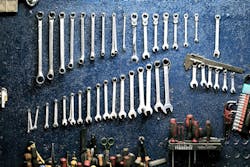Warren Buffett, CEO of Berkshire Hathaway, has long been touted as an influential leader. Under his leadership, Berkshire Hathway’s stock gained more than 20 percent since 1965. And, by all accounts, when times get tough, Buffett faces problems head on.
Buffett is, unquestionably, a revered leader. But, he’s just one example of a great leader. What makes his and other people’s leadership qualities stand out as great versus ones that are simply just good?
Kelly Cooper prefers to lead from behind the scenes, by assessing the big picture. He spends much of his time visiting body shops, observing their processes, and eventually formulating an assessment of the business. While he can’t match Buffett’s renown, Cooper is nonetheless a respected leader.
Through observing how other shop leaders work, Cooper, vice president of operations for 1Collision Network, doesn’t think there is a cookie-cutter way to fix shop issues.
“Every shop has its own restraints,” he says. “It could be the equipment or the management system but it all depends on the shop.”
He’s seen it in person: All shop owners have their own habits that make them effective or ineffective leaders. Some leaders can be good and others can be great—leaving a lasting impact on those they oversee—even in a busy, chaotic shop setting.
Here are Cooper’s tips on what can allow a good leader to evolve into an exceptional one.
As told to Melissa Steinken
Use all available resources.
We have access to repair procedures and technology like we’ve never had before. A leader can never access resources too much. For instance, with OE repair procedures, check them for every repair and document that you’ve done it.
A shop can never be too safe with the amount of technology coming down the road and the ADAS features in cars. A great leader will take advantage of the resources that are teaching about the new technology and repairs.
Make it a habit: Go the extra mile and video yourself reading through the OEM repair procedures or take a photo of you reading it. Then, there will be photo evidence that you have done what you said.
Become a student.
It’s about asking questions. You have to realize, as a leader, that you might not know every single answer and that’s OK. Don’t be afraid to learn from your staff.
I often see shop owners struggling with the changes in vehicle technology and updates to repair procedures. I get there, and they seem like it’s too much information coming at them. This is a great example of where shop leaders can take a step back and learn.
Leaders can learn by researching OEM repair procedures or by asking their teams what they know about the new vehicle technology and how to repair it.
Make it a habit: Sit down and interview each employee alone. Find out what they know about the repair process in the shop and ask them questions on how they are managed. Go into that meeting with ears wide open.
Demand that expectations are met.
Stop trying to jump in and critique your shop team before you assess if your expectations are being met. Communication is key to making sure that expectations are followed.
For instance, have a morning planning meeting with the team. Check in with the team and make sure everyone knows what the goals are for the day and how many vehicles need to be done at a certain time.
Morning meetings and release meetings are great ways for the team to collaborate and air issues. The technicians have a chance to let the team know where the repairs are on the vehicle and if they need any assistance.
One thing I recommend other shop owners do is to list out all the positions on their team and write out what each role does in the shop. Then observe, for a week or so, if these roles are being carried out the right way.
Make it a habit: Take a step back as a leader and look at your staff all on the same playing level. When there is an issue, do not think about their position in the company or job title. Talk to them as a fellow leader.
Look for an outside perspective.
Don’t be afraid to reach out to others in the industry and ask for help. Shop owners should keep in touch with paint companies, for example, because they do a lot of business development training.
Shop owners should also be reading a lot about the industry and following news in industry trade publications. Or, they need to attend industry-wide events like the Collision Industry Conference to form contacts. I know that I can call up people at companies like asTech and ask them what’s going on with the latest diagnostic scan tool technologies; those types of connections are important to have so that you don’t get stuck in a rut with your body shop.
My favorite book right now is called Courage to Execute by James Murphy, which goes over how to build a culture of high performance in the business and what military units can teach about leadership. I found a lot of the content relatable to body shop processes.
When I go into shops, I’ll help owners out by interviewing every employee for a few minutes and then put together an assessment of every situation. Then, I’ll go to the manager with the assessment and point out the problem. Often, leadership problems can’t be seen until there is a new set of eyes involved.
Make it a habit: When finding and going to industry events, walk into the events with the mindset that you don’t know anything about the topic you’re going to be listening to.
About the Author

